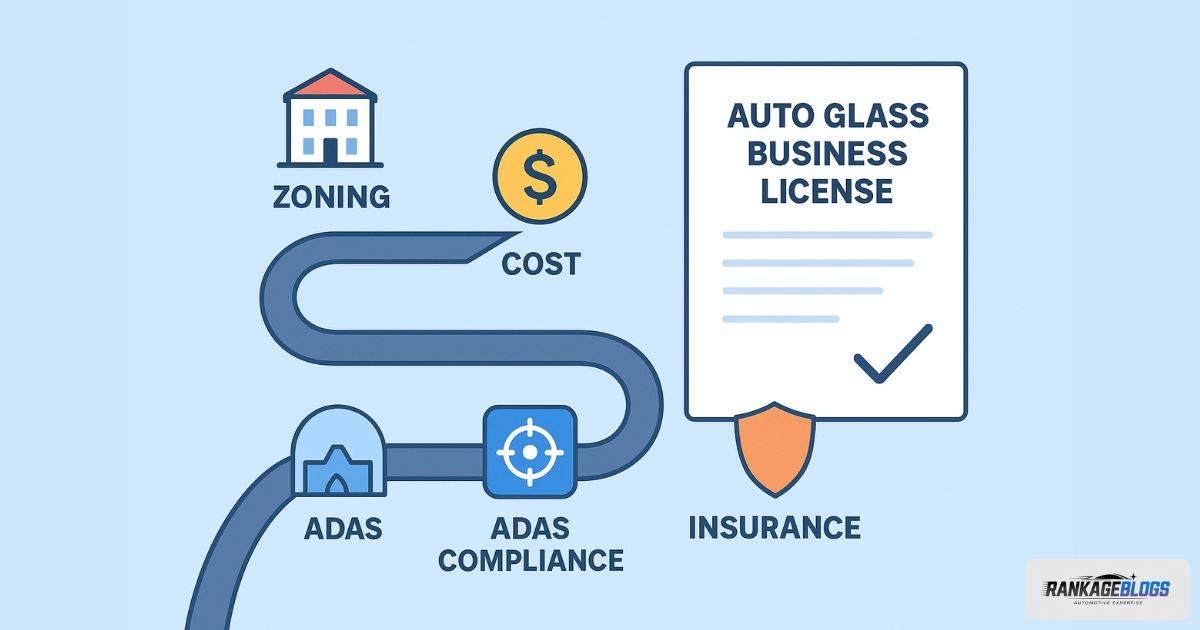Starting an auto glass business in the USA is a promising venture, but the path to becoming fully licensed and operational can feel like navigating a complex web of U.S. state requirements and regulations. Many aspiring entrepreneurs ask “Do I need a license to start an auto glass business?” and are unsure where to begin, asking themselves, “What specific business license do I need, and how do I ensure I’m fully compliant from day one?” This guide is designed to cut through that confusion as you navigate the 2025 regulatory landscape.
Our 2025 Starter Guide provides a clear, step-by-step road map for obtaining your auto glass business license. We’ll break down everything from the different types of licenses and permits to accessing start-up resources, understanding the real costs involved, the critical ADAS calibration laws you must know, and securing proper auto glass business insurance. Consider this your one-stop resource for launching your business confidently and legally.
Introduction: Cutting Through the Licensing Confusion
The question of licensing is the single biggest hurdle for new auto glass entrepreneurs in the USA. On forums like Reddit and Quora, the same issues arise repeatedly: “Is a general business license enough?” or “My state requires a specific glazing contractor license—how do I apply?” This confusion often leads to delays, fines, or even application rejections.
This section is designed to eliminate that guesswork by providing absolute clarity. We will directly address the most common pain points gathered from real business owners, transforming overwhelming legal jargon into a simple, actionable checklist. You will finish this guide knowing exactly what you need, why you need it, and how to get it without wasting time or money.
“Do I Need a License?” – Auto Glass Business vs. Technician Rules
In the United States, there is no single federal auto glass business license; instead, a combination of state, county, and city regulations apply. Before you invest in repair tools or rent a shop, you must answer this foundational question. The business registration requirements for an auto glass business are not one-size-fits-all and often differ from the credentials needed by individual technicians.
This distinction causes significant confusion. We will clarify the legal separation between your company’s operational permits and your employees’ professional certifications. Understanding this difference is crucial for structuring your business correctly, securing the right insurance, and avoiding compliance pitfalls that could shut down your operations before you even begin.
The 3 Main License Types (And Which One You Need)
You’ll primarily encounter three categories of business license requirements. First, a General Business License is the baseline, registering your company with your city or county and establishing your auto glass shop registration. Second, a Glazing Contractor License is a specialty contractor license required in many states (like California BAR and Florida) that specifically authorizes you to install auto glass.
This often involves passing an exam and proving experience. Third, you have various auto glass installation permits, which can include environmental permits for glass disposal and, for mobile operations, a mobile glass service permit. To determine which you need, check with your state’s contracting board or business licensing department—they will specify if auto glass falls under a specialty classification.
- Problem: “I’m confused about the difference between a general business license and a glazing license.”
- Solution: A general business license simply allows you to operate a business in your locality. A glazing contractor license is a specialized credential proving you have the skills and knowledge to safely install glass. In many states, you need both.
Mobile Auto Glass vs. Repair Shop: Key Licensing Differences
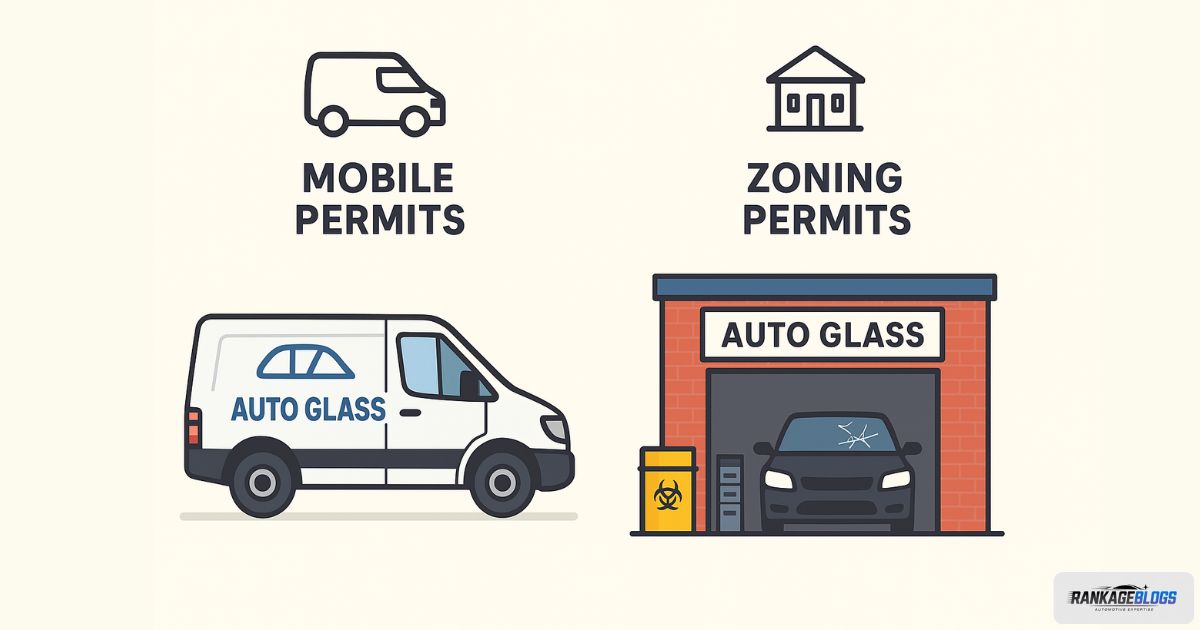
The choice between a mobile service and a physical shop directly impacts your licensing application process. A brick-and-mortar auto glass shop must comply with strict zoning laws for glass shops, building codes, and signage regulations. You’ll need a certificate of occupancy and may face more rigorous inspections.
Conversely, a mobile auto glass service must secure specific mobile service permits that allow you to operate across different jurisdictions. Learning about mobile auto glass services can help you understand the operational requirements for this business model.
Understanding Florida vs Texas auto glass regulations or New York state glazing codes helps you identify the strictest states for auto glass businesses versus the easiest states to start a glass business for your specific operation type. Your business model dictates your regulatory path.
- Problem: “I want to start a mobile van service. Do I need the same license as a physical shop?”
- Solution: While the core glazing or business license may be similar, mobile operations require additional permits for the vehicle itself and must ensure compliance across all the cities or counties they serve, not just one location.
Zoning Laws and Location Requirements for Glass Shops
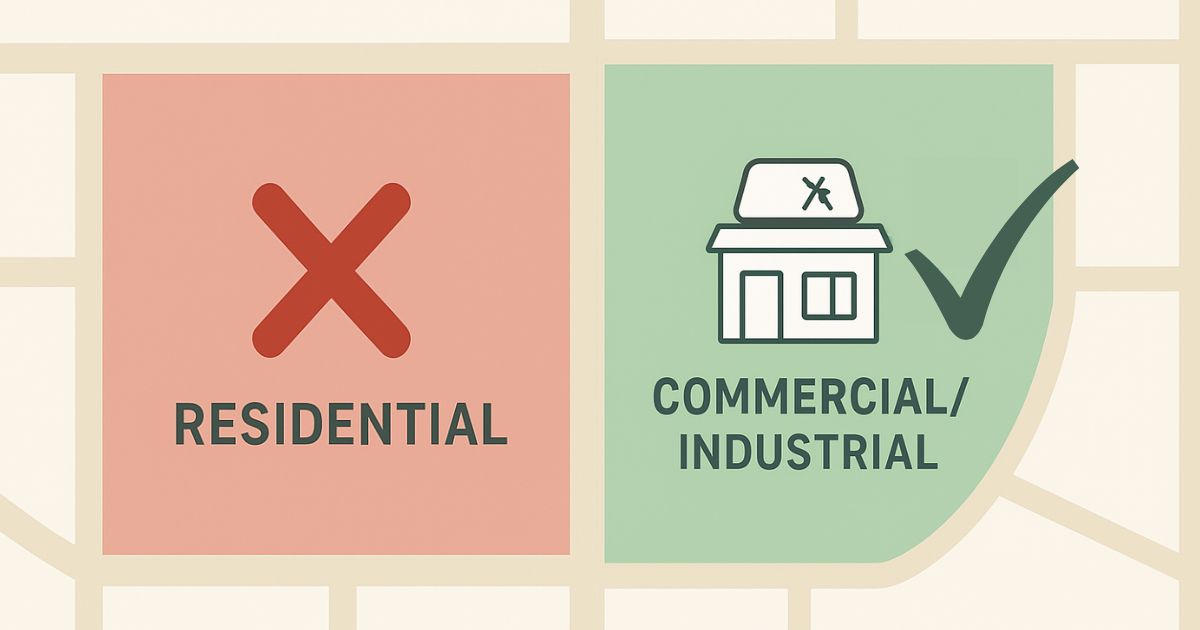
If you plan to operate from a physical location, zoning laws for glass shops are a critical, non-negotiable part of your auto glass shop registration. Most cities zone areas for commercial or industrial use; operating an auto glass business in a residentially zoned area will lead to immediate shutdowns and fines.
You must apply for a zoning permit and a certificate of occupancy from your local planning department. They will assess parking availability, waste management plans, and the environmental impact of your operations. Before you sign a lease, always verify that the property is correctly zoned for your type of business to avoid costly mistakes.
- Problem: “I found a cheap space for my shop, but how do I know if it’s zoned correctly?”
- Solution: Contact your local city planning or zoning department before signing any lease. Provide them with the property address and your business details (“auto glass repair and installation”) for a definitive answer.
The Modern Mandate: ADAS Calibration Compliance
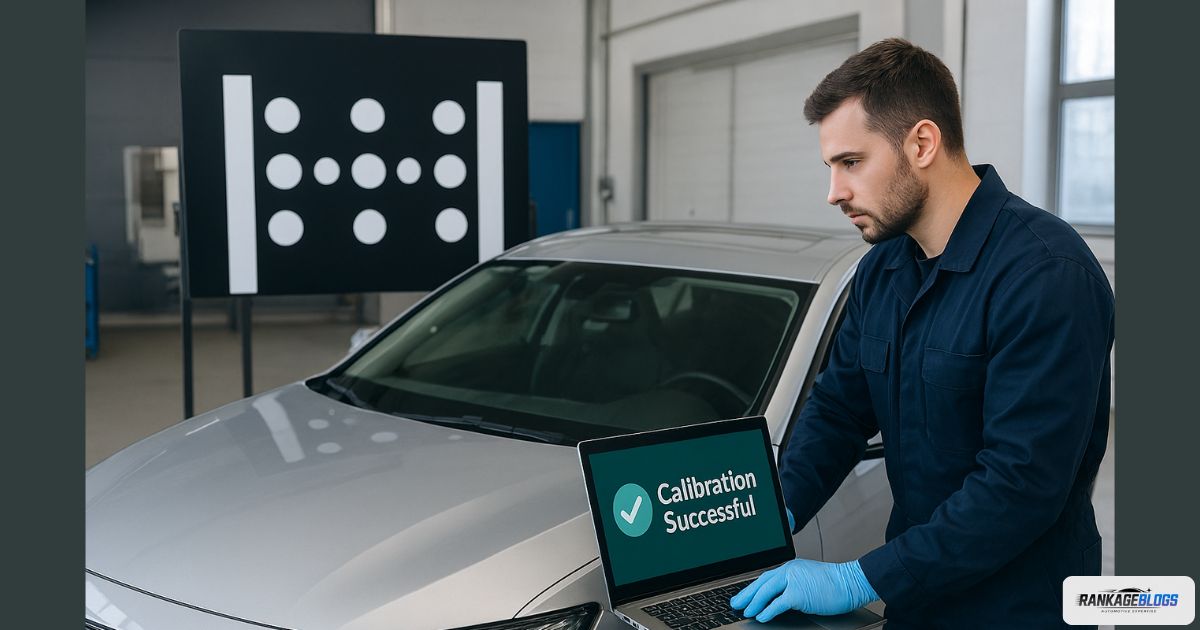
A critical and often overlooked aspect of licensing is demonstrating ADAS calibration compliance. While not a “license” itself, many states now require businesses to prove they can properly calibrate Advanced Driver-Assistance Systems after a windshield replacement as a condition of their motor vehicle repair registration.
This means you must either invest in the proper ADAS calibration certification and equipment or have a formal partnership with a provider who does. Understanding ADAS calibration requirements is essential for modern auto glass businesses. Inspectors may check for this capability during your pre-license inspection. Failing to address these ADAS calibration legal requirements can result in your application being denied or your business being deemed non-compliant after opening.
The No.1 Thing That Can Shut You Down: ADAS Calibration & Compliance Laws
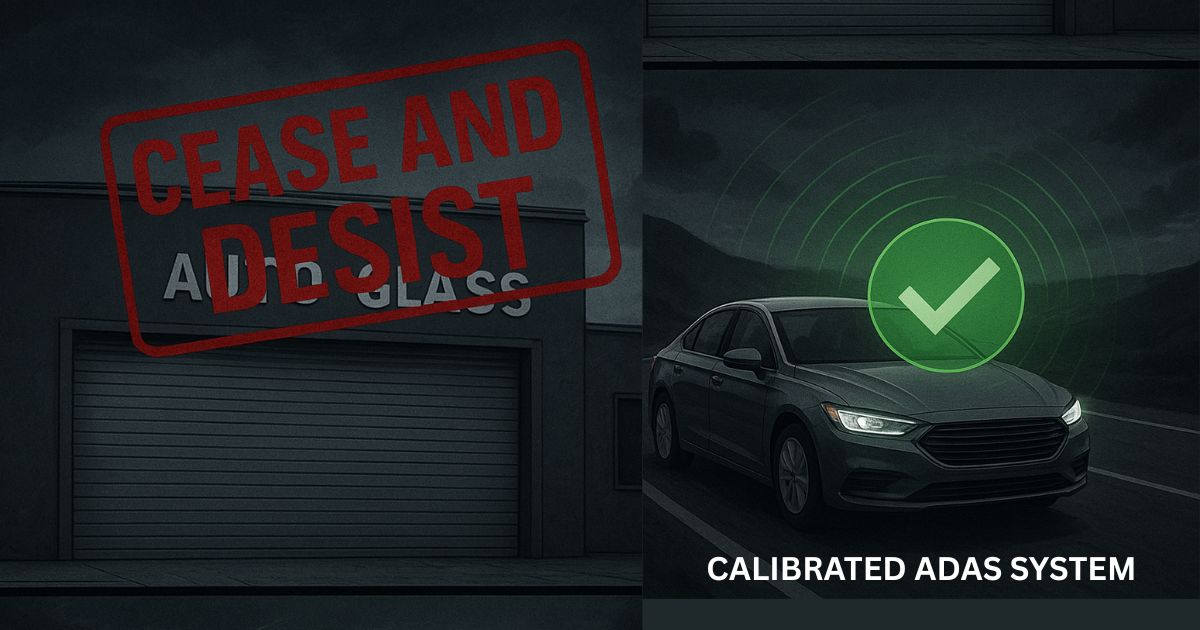
In today’s automotive landscape, ADAS calibration is not just a technical service—it’s a major legal and liability issue. Modern vehicles with Advanced Driver-Assistance Systems (ADAS) require precise calibration after a windshield replacement to ensure features like lane departure warning and automatic emergency braking function correctly.
Failure to offer or correctly perform this service can lead to catastrophic accidents, massive lawsuits, and the revocation of your auto glass business license. This section addresses the top fear of new shop owners: the legal and financial risks associated with modern vehicle technology. For a complete overview of all federal, state, and insurance-mandated auto glass shop business regulations, refer to our comprehensive pillar guide.
Is ADAS Calibration Legally Required in Your State?
While federal FMVSS regulations set safety standards for glass installation, ADAS calibration legal requirements are often enforced at the state level through consumer protection laws. Many states now legally consider a windshield replacement incomplete without proper calibration, making you liable for any subsequent accidents.
Furthermore, insurance companies often require proof of ADAS calibration certification before reimbursing a claim. Even in states without explicit laws, following the Auto Glass Safety Council (AGSC) standards is the industry benchmark for safety standards compliance and will be critical in any liability dispute.
Liability and Insurance Risks of Skipping Calibration
Skipping or improperly performing ADAS calibration exposes your business to enormous risk. If a vehicle you serviced is in an accident and improper calibration is a factor, you could be held liable for bodily injury and property damage. Your business insurance may refuse to cover the claim if you failed to follow industry safety standards compliance.
This makes ADAS calibration certification not just a best practice, but a core component of your risk management strategy. It directly protects your business assets and reputation.
- Problem: “I can’t afford a $15,000 calibration system right now. Can I just sublet the work?”
- Solution: Yes, you can partner with a nearby shop that has the equipment. Ensure you have a formal agreement and collect certificates of calibration for every job to maintain your records and limit liability.
Environmental Compliance: Permits and Hazardous Waste Handling
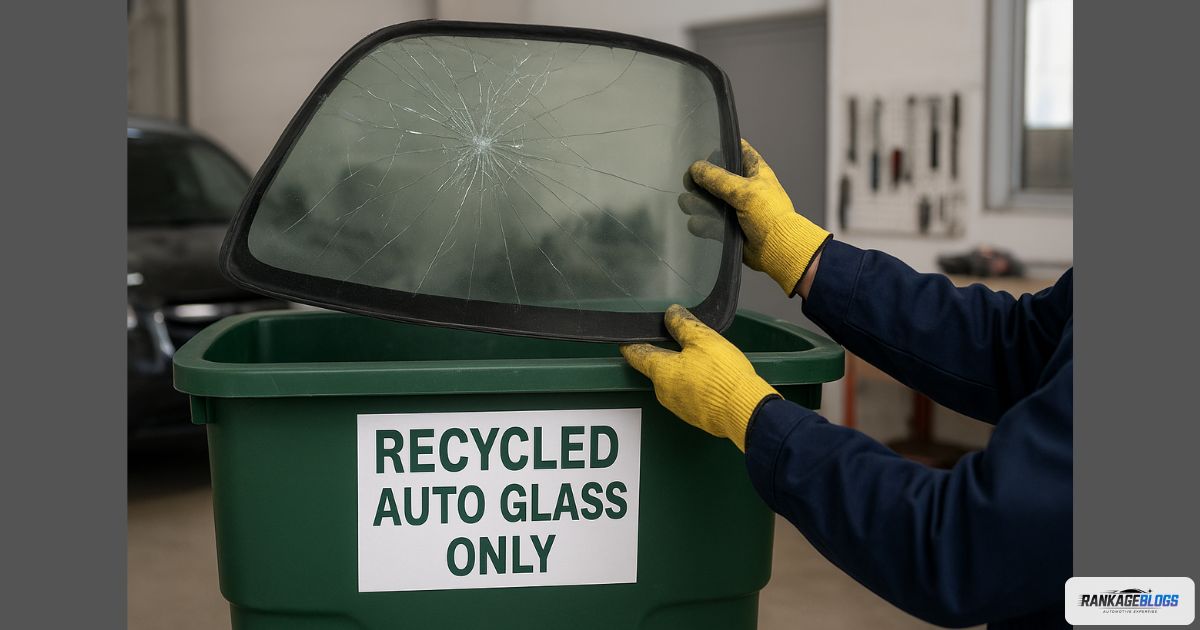
Environmental compliance is a frequently overlooked aspect of the licensing application process. Old windshields are considered hazardous waste due to the laminated glass and PVB interlayer. You cannot simply dispose of them in a standard landfill.
You must secure an environmental permit for glass disposal from your state’s environmental agency and maintain meticulous record-keeping requirements of your waste stream. This includes properly storing, transporting, and recycling old glass through certified facilities. Failure to do so can result in severe penalty fees for non-compliance and jeopardize your entire business operation.
- Problem: “What am I supposed to do with all the old windshields? My regular trash company won’t take them.”
- Solution: You must contract with a certified recycling company that handles auto glass. They will provide you with a waste manifest for your records, which you may need to present during a state inspection.
The Real Cost of Getting Licensed (Beyond the Application Fee)
Many newcomers focus solely on the state’s application fee and are blindsided by the full financial picture. The true total startup cost for an auto glass shop includes several mandatory, upfront expenses beyond the basic license. Understanding these auto glass startup costs is essential for creating a realistic business plan template and securing adequate financing options.
When creating your business plan, explore all financing options and funding opportunities available for small businesses in your state. When budgeting for your auto glass shop license cost, remember to include both initial and recurring fees to avoid cash flow problems down the line.
Understanding and Getting a Surety Bond
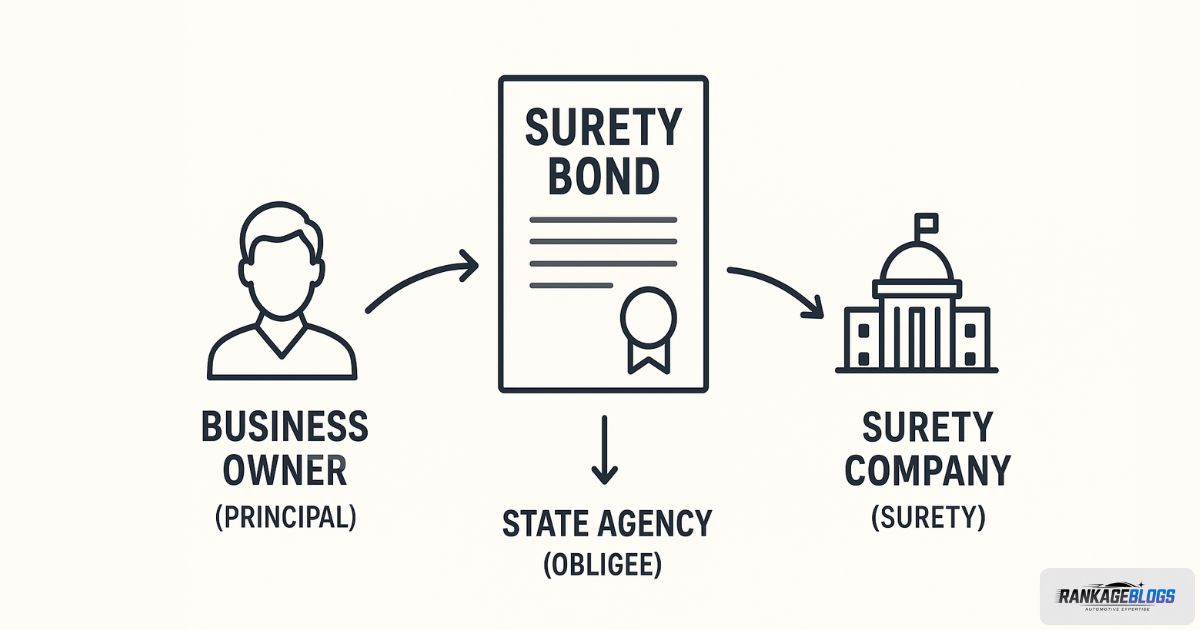
A surety bond is a three-party agreement that guarantees your business will comply with state regulations. It protects your customers from financial loss if you fail to complete a job or violate licensing laws. The cost isn’t a fee but a premium, typically 1-5% of the total bond amount (e.g., a $10,000 bond may cost $100-$500 annually). Your credit score significantly impacts this rate. You must purchase the bond from a licensed surety company before the state will issue your glazing contractor license.
- Problem: “How much is a surety bond for a glass shop?”
- Solution: Bond amounts are set by the state, but the cost you pay is a percentage of that amount. For a new business with good credit, expect to pay 1-3% of the bond’s face value annually.
Business Insurance Must-Haves (It’s Not the Same as a License!)
Business insurance is a separate, critical layer of financial protection. Auto glass business insurance is essential for comprehensive coverage. At a minimum, you need General Liability Insurance to cover third-party bodily injury or property damage. You will also need Commercial Auto Insurance (especially for mobile operations), and Garagekeeper’s Liability Insurance to cover customer vehicles while in your care.
These insurance requirements are mandatory for securing partnerships with insurance companies (DRPs) and are a non-negotiable part of your startup checklist. Understanding your auto glass insurance coverage options is crucial for managing business risks effectively. You need adequate coverage for insurance claim processing and should understand how zero-deductible insurance laws in certain states affect your business operations and warranty requirements.
Full Cost Breakdown Table: License, Bond, Insurance, Training
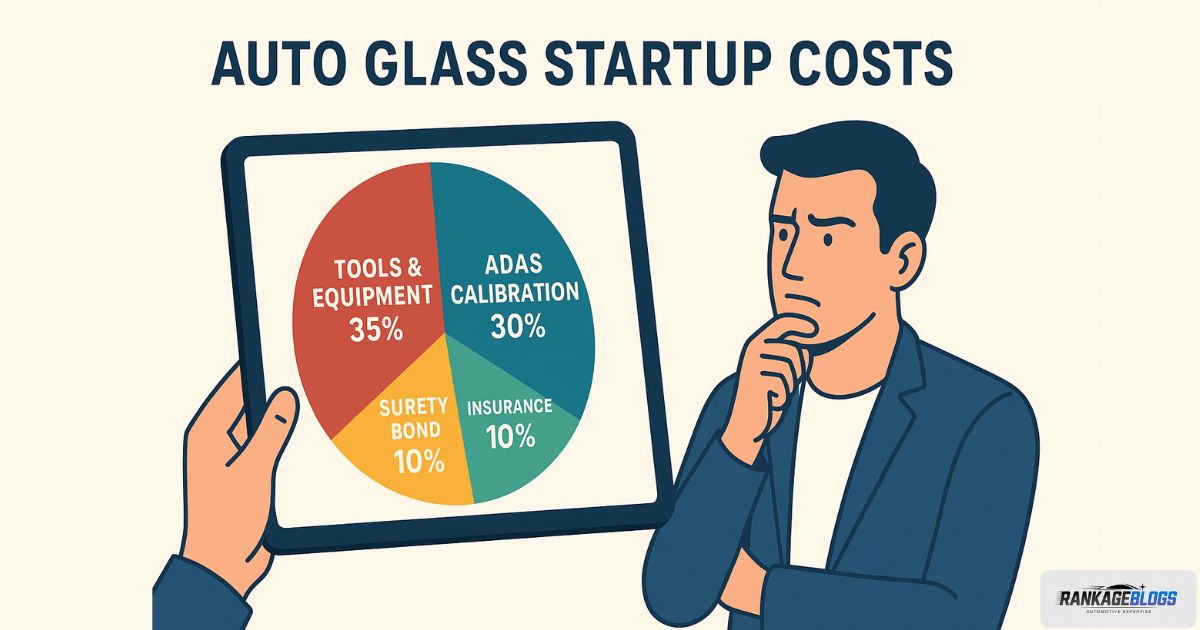
| Cost Category | Low Estimate | High Estimate | Notes |
| State License & Application Fees | $100 | $500 | Varies significantly by state (e.g., California BAR registration is ~$200) |
| Surety Bond Premium | $150 | $750 | Based on a $5,000-$15,000 bond requirement and your credit |
| General Liability Insurance | $800 | $2,500+ | Annual premium, highly dependent on coverage limits |
| Tools & Equipment | $5,000 | $25,000+ | Includes glass handling, installation tools, and basic calibration tools |
| ADAS Calibration Certification & Equipment | $5,000 | $20,000+ | Training is lower cost; equipment is a major investment |
| Environmental Permits & Waste Setup | $200 | $1,000 | Includes initial permits and recycling bin setup |
| License Renewal Fees (Biennial) | $50 | $300 | Required every 1-2 years to maintain active status |
| Auto glass market research | $500 | $2,000 | Essential for business planning and marketing strategies |
| Business bank account setup | $50 | $200 | Initial deposit and monthly maintenance fees |
| Sales tax permits | $0 | $100 | Varies by state and local jurisdiction |
| Repair tools and equipment certification | $5,000 | $25,000 | Basic to advanced tool sets and certification costs |
- State License & Application Fees: California’s BAR registration is approximately $200.
- License Renewal Fees (Biennial): Typically range from $50 to $300, depending on the state and local requirements.
- Sales Tax Permits: Costs vary by state and local jurisdiction; some states may offer them for free, while others may charge up to $100.
Ongoing Costs: Renewal Fees and Penalties for Non-Compliance
Your financial obligations don’t end after launch. Be prepared for license renewal requirements every 1-2 years, which include renewal fees. You must also budget for continuing education courses to stay current with OEM glass certification and new ADAS calibration requirements.
Most critically, understand the penalty for unlicensed auto glass work, which can include hefty fines (thousands of dollars), immediate cease-and-desist orders, and in some cases, criminal charges.
The 5-Step Licensing Process for Any State
While each state has its own specific agency and forms, the fundamental licensing application process follows a predictable pattern. By breaking it down into these five steps, you can methodically navigate the bureaucracy of any state, from California BAR registration to Florida mobile auto glass permits.
This systematic approach prevents you from missing critical deadlines or documents that lead to application rejection reasons and wondering “what to do if auto glass license is denied.”
Step 1: Find YOUR State’s Governing Agency (We Made It Easy)
The first, most critical step is identifying the correct governing body. This is not always intuitive. For example, in California, it’s the Bureau of Automotive Repair (BAR); in Florida, it’s the Department of Agriculture and Consumer Services (FDACS); and in Texas, it’s the Department of Licensing and Regulation (TDLR).
A quick online search for “[Your State] auto glass business license” or “glazing contractor license” will direct you to the correct agency.
- Pro Tip: Bookmark the U.S. Small Business Administration (SBA) website for your state—it’s a free, authoritative start-up resource for finding the correct agencies and understanding their requirements.
Bookmark their website, as it will be your primary source for applications, checklists, and updates.
Step 2: Get Your Paperwork in Order (The Document Checklist)
State agencies are strict about documentation. A typical startup checklist for your application includes:
- Proof of business formation (LLC or Corporation filing documents)
- Your Employer Identification Number (EIN) from the IRS, which you can obtain after reviewing the official IRS business license requirements
- Social Security Number (for sole proprietors)
- Proof of your surety bond
- Certificate of Insurance for business insurance
- Detailed financial statements
- Proof of technician certification requirements for you and your employees
- Your auto glass business plan
- Sales tax permits for retail operations
- Proof of business bank account
- Documentation of employee certification mandates for your team
Step 3: Choose Your Path: Get Certified First or Apply First?
This is a common chicken-or-egg dilemma. Some states require you to hold specific certifications (like AGSC standards or OEM glass certification) before you can apply for the license. Others allow you to apply and then require proof of certification within a certain timeframe.
The steps to become a certified auto glass technician vary by state. Some require specific certifications like NAGS certification or completion of apprenticeship training programs before licensing. The best practice is to contact the licensing board directly to confirm their sequence. When in doubt, obtaining key certifications first strengthens your application and demonstrates your commitment to quality standards compliance.
Step 4: Submit Your Application & Pay Fees (The Right Way)
Once your packet is complete, submit it by the method specified by the state agency—often online, but sometimes by certified mail. Pay all application fees with a business check or credit card and retain a copy of everything you submit and the payment confirmation.
Incomplete applications or incorrect payments are one of the most common application rejection reasons, leading to delays of several weeks or months.
Step 5: Pass the Inspection (What to Expect)
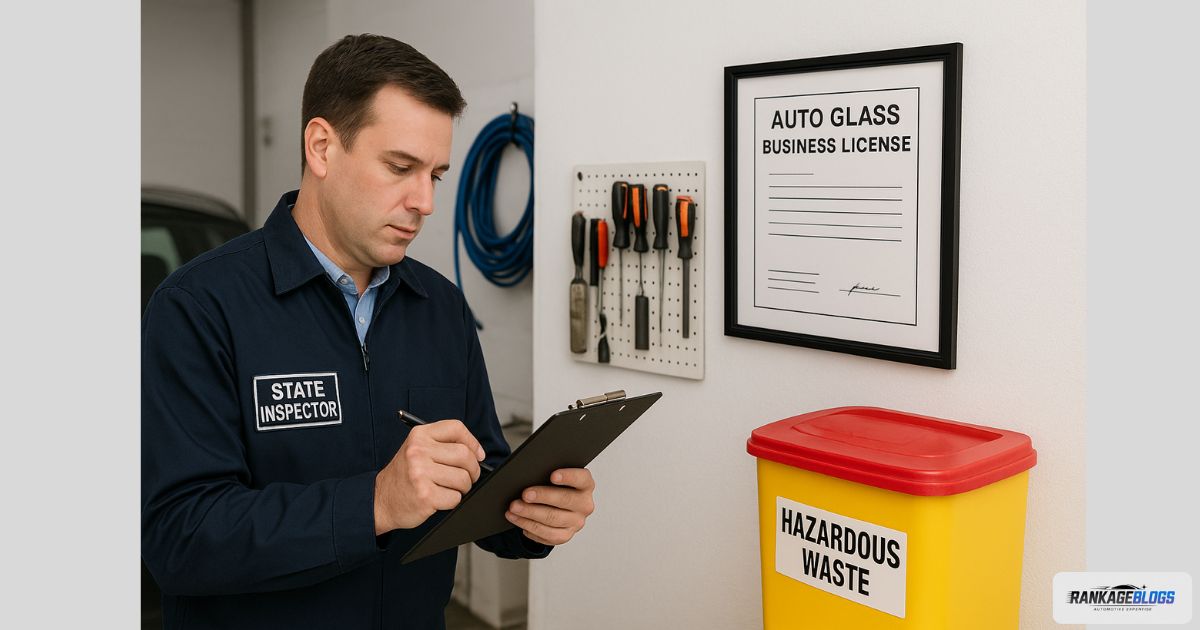
After reviewing your application, many states will conduct a pre-license inspection of your shop. Inspection protocols will verify your physical location complies with zoning laws, your facility has the required equipment, your hazardous waste handling procedures are in place, and your record-keeping requirements system is established. The inspector will also check for required postings, like your registration certificate and consumer rights information.
- Pro Tip: Conduct a mock inspection using the state’s checklist a week before the real one. This helps you identify and fix any minor auto glass license mistakes in advance.
Prepare for this inspection as if your business depends on it—because it does.
Final Checklist Before Launching
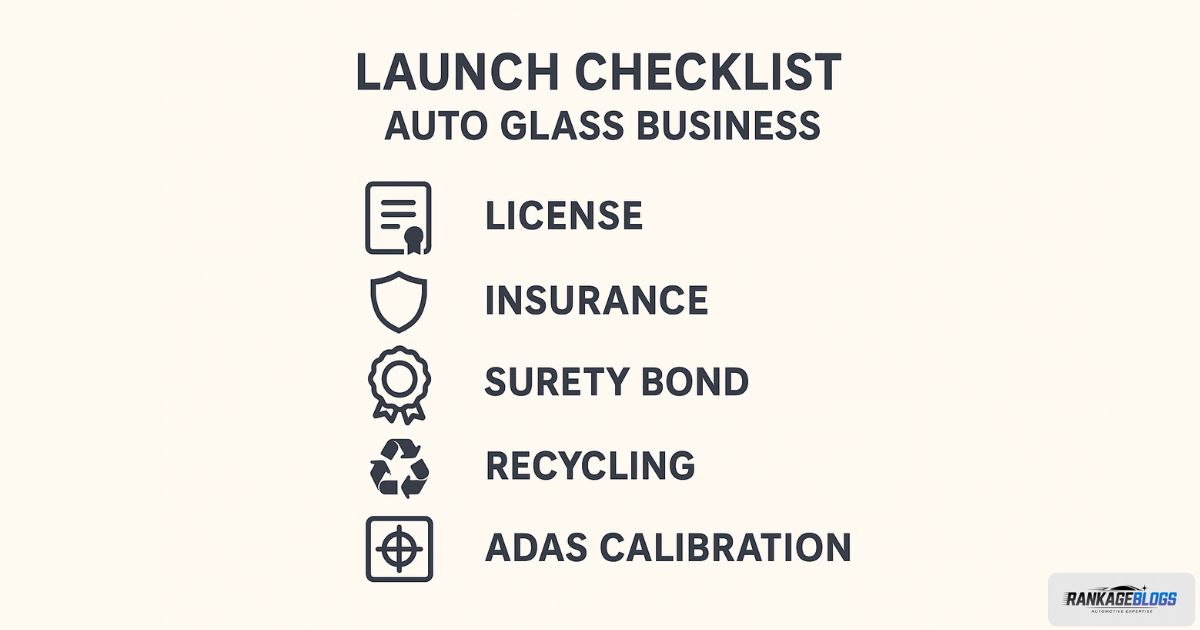
Before you open your doors, run through this final checklist to ensure you’ve covered all critical legal and operational bases:
- All required licenses and permits are obtained and displayed.
- Business insurance policies are active and meet state minimums.
- Surety bond is secured and filed with the state.
- Zoning and location permits are approved.
- Hazardous waste disposal contract is in place and an EPA ID number is secured if required.
- Verify and document ADAS calibration capabilities (in-house or through a verified partner).
- All technicians have necessary certification.
- Record-keeping system for jobs, waste, and calibrations is established.
- Sales tax permits obtained for retail operations.
- Business bank account established and funded.
- Employer Identification Number (EIN)secured from IRS.
- Marketing strategies developed for customer acquisition.
- Written estimate and repair invoice templates prepared.
- All employee certification mandates verified and documented.
Common Mistakes to Avoid
Many new business owners make avoidable auto glass license mistakes that cost them time and money. Learning from established businesses about choosing reliable auto glass providers can help you avoid common industry pitfalls. One of the most serious is overlooking ADAS calibration legal requirements, which can lead to massive liability. Other common errors include:
- Not verifying zoning laws before signing a lease.
- Underestimating the total auto glass startup costs and running out of capital.
- Failing to maintain proper record-keeping requirements for waste disposal.
- Missing license renewal requirements and letting your license lapse.
- Not understanding state glazing codes specific to your location.
- Failing to account for specialized requirements like Massachusetts auto glass shop license
- Overlooking local regulations such as Smog Check station requirements in certain states.
- Not obtaining necessary seller’s permit for parts sales.
Conclusion
As we move through 2025, the auto glass industry continues to evolve with stricter safety and environmental rules. Part of this evolution is educating customers on the dangers of DIY auto glass repair to ensure their safety and uphold industry standards. Navigating the path to a fully licensed auto glass business is a detailed process, but it is entirely manageable with the right information.
By understanding the different license types, prioritizing ADAS calibration and environmental compliance, budgeting for all costs including license renewal fees, and following the five-step application process, you build your business on a foundation of legality and trust. Now that you have a clear understanding of the requirements, your next move is to take action. Visit your state’s official licensing website, gather your documents, and begin the process of establishing a reputable and successful auto glass business.
H2: Frequently Asked Questions (FAQs)
Q: “I’m just one person in a van. Do I need a full business license?”
A: Yes, you need a business license, mobile service permit, and likely a glazing contractor license to avoid legal and financial risk.
Q: “What’s the difference between AGSC certification and a state license?”
A: A state license is a legal requirement, while an AGSC certification is a voluntary industry credential for safety standards.
Q: “What is the most common reason license applications get rejected?”
A: Applications are rejected for incomplete paperwork, missing proof of insurance or bond, or a failed facility inspection.
Q: “What are the continuing education requirements for license renewal?”
A: Continuing education requirements vary by state, often covering ADAS calibration or OEM glass installation.
Q: “Are there specific advertising rules for auto glass shops?”
A: Yes, you must display your license number and avoid deceptive claims about “lifetime warranties” or “OEM-only” parts.
Q: “What’s the difference between an automotive repair dealer license and auto glass specific licensing?”
A: An automotive repair dealer registration is broader, while auto glass specific licensing like FDACS registration focuses on glass.
Q: “Do I need a station license for my physical shop location?”
A: Yes, a brick-and-mortar location requires a station license or certificate of occupancy to meet facility requirements.
Q: What type of technicians are frequently required to service vehicle glass?
A: Auto glass technicians are required, often with skills in ADAS calibration.
Q: Is doing car glass a profitable business?
A: Yes, the auto glass business is generally considered profitable.
Q: How much does an auto glass business make?
A: An auto glass business make varies significantly by location, scale, and volume.
Q: Is Safelite auto glass a franchise?
A: No, Safelite Auto Glass is a corporate-owned chain and not a franchise.
Q: State by state licensing requirements for auto glass businesses Texas
A: Texas licensing requires a Registered Vehicle Glass Company permit.
Q: State by state licensing requirements for auto glass businesses California
A: California licensing requires a Glass Dispensary license from the Bureau of Automotive Repair.
Q: What zoning is required for auto repair?
A: Zoning for auto repair is typically commercial (C) or industrial (M).
Q: What is a car workshop license and how do I get one?
A: A car workshop license is a mandatory business and operational permit required to legally run an auto repair shop.
Q: What are the legal requirements for opening a garage?
A: Legal requirements for opening a garage include business registration, zoning approval, and environmental permits for waste handling.
Q: What is pay-as-you-go commercial auto insurance?
A: Pay-as-you-go commercial auto insurance is a usage-based policy where premiums are calculated from actual vehicle mileage or driving data.
Q: What type of car insurance is needed for a company vehicle?
A: A company vehicle must be insured under a commercial auto insurance policy, not a personal one.
Q: What type of license do I need for an auto glass business?
A: You need a general business license and often a specific auto glass or glazing contractor license.
Q: How much does an auto glass business license cost?
A: An auto glass business license cost typically ranges from $50 to $500.
Q: Do I need special certification for ADAS calibration?
A: Certification for ADAS calibration is a critical industry standard but not always a legal mandate.
Q: What are the insurance requirements for auto glass shops?
A: Insurance for auto glass shops requires general liability, garagekeepers, and commercial auto coverage.
Q: How long does it take to get an auto glass business license?
A: Getting an auto glass business license can take from a few weeks to several months.

